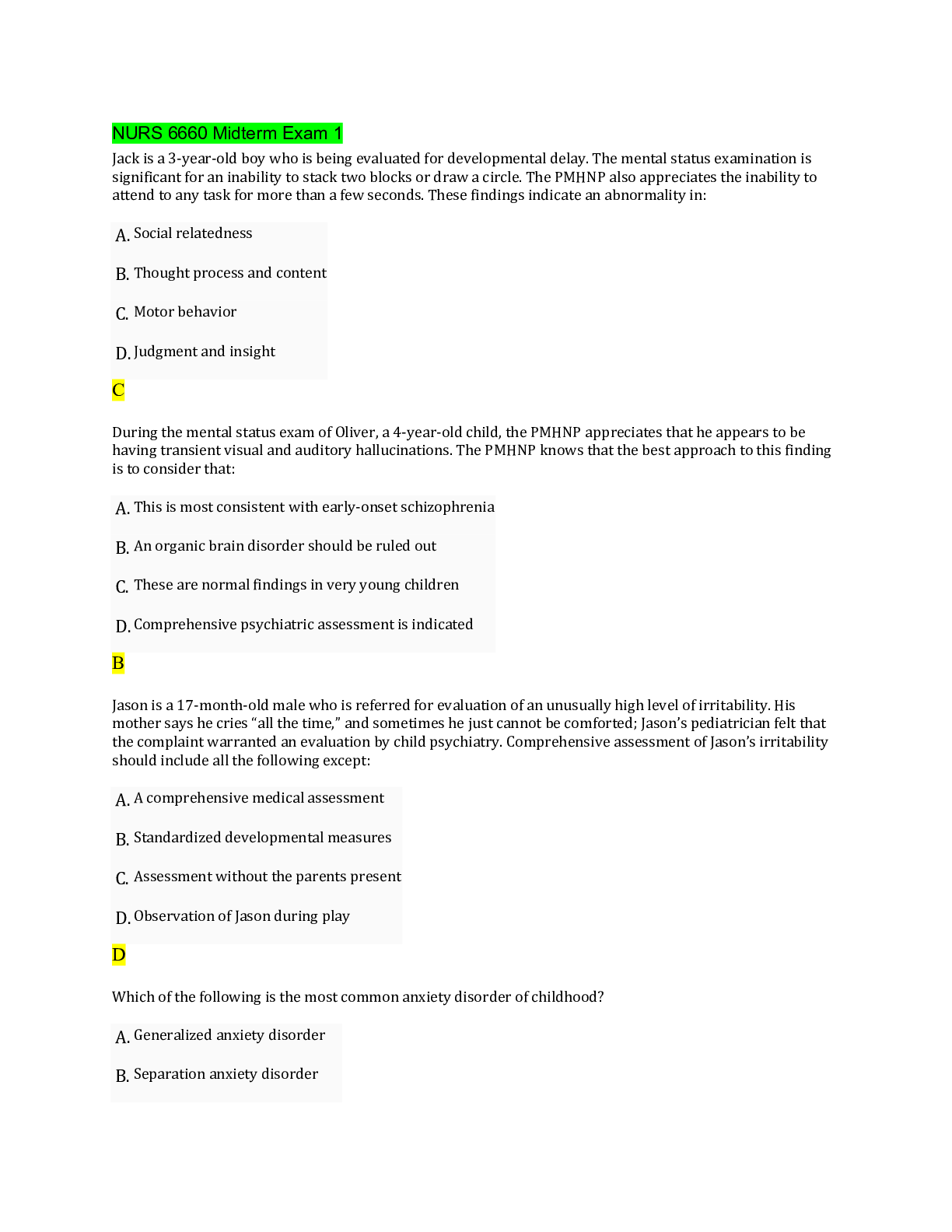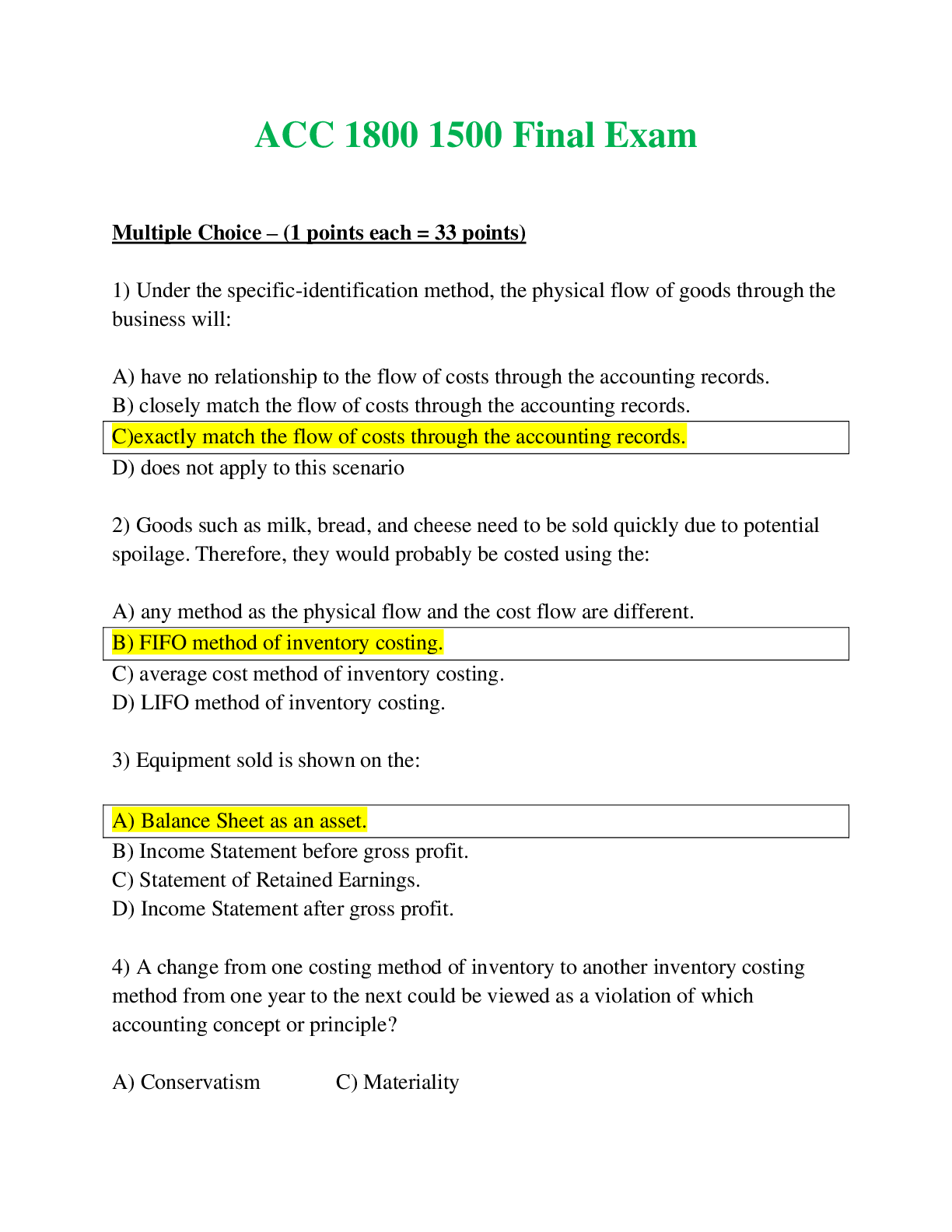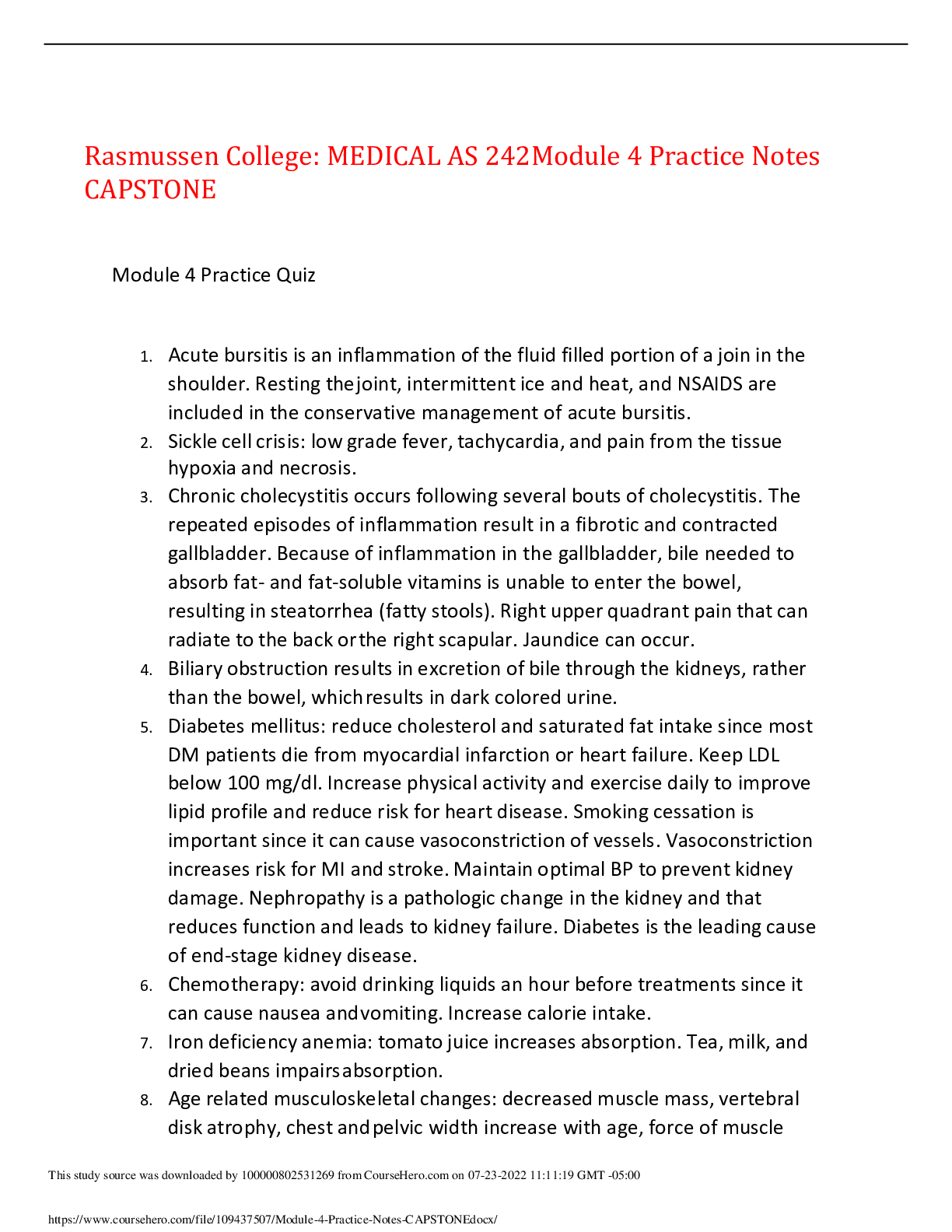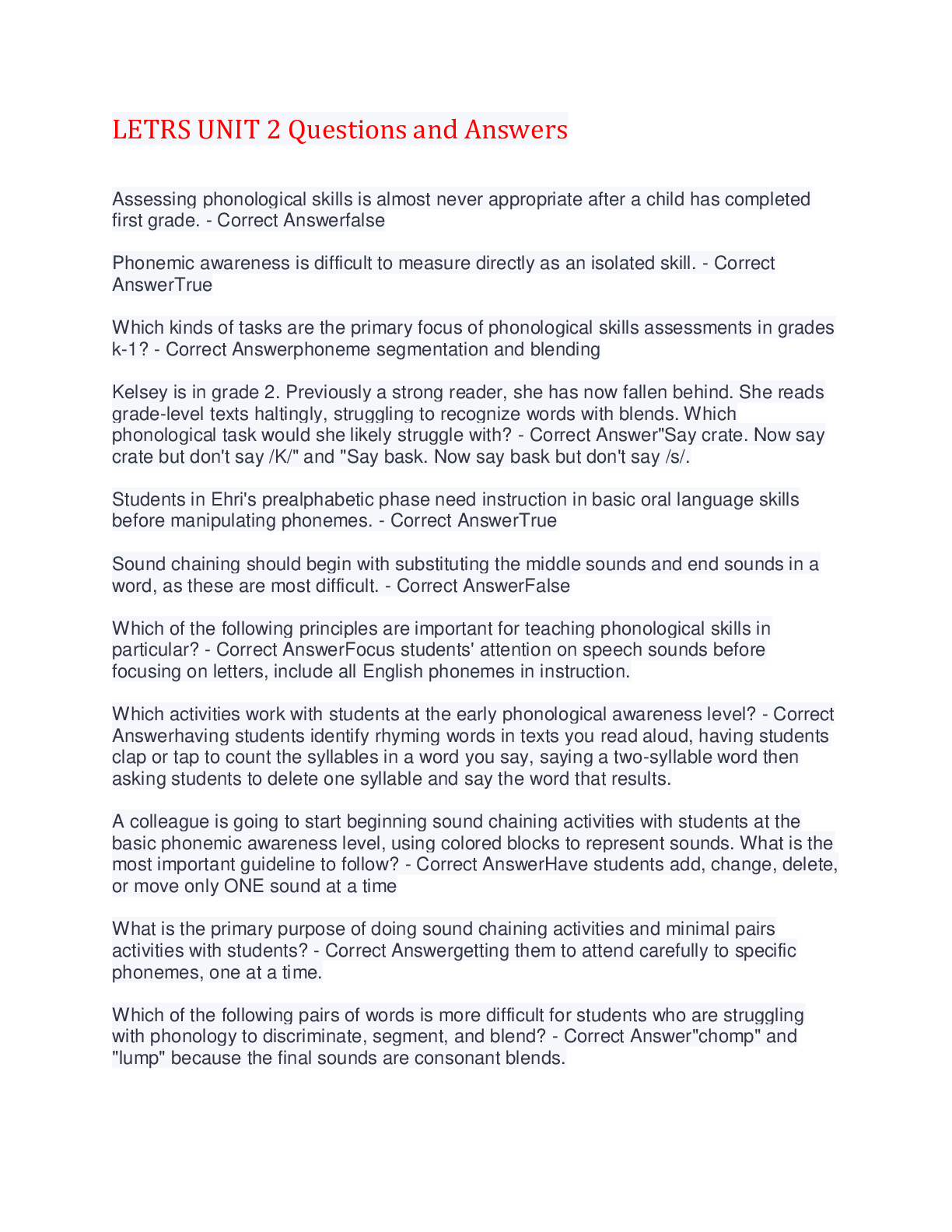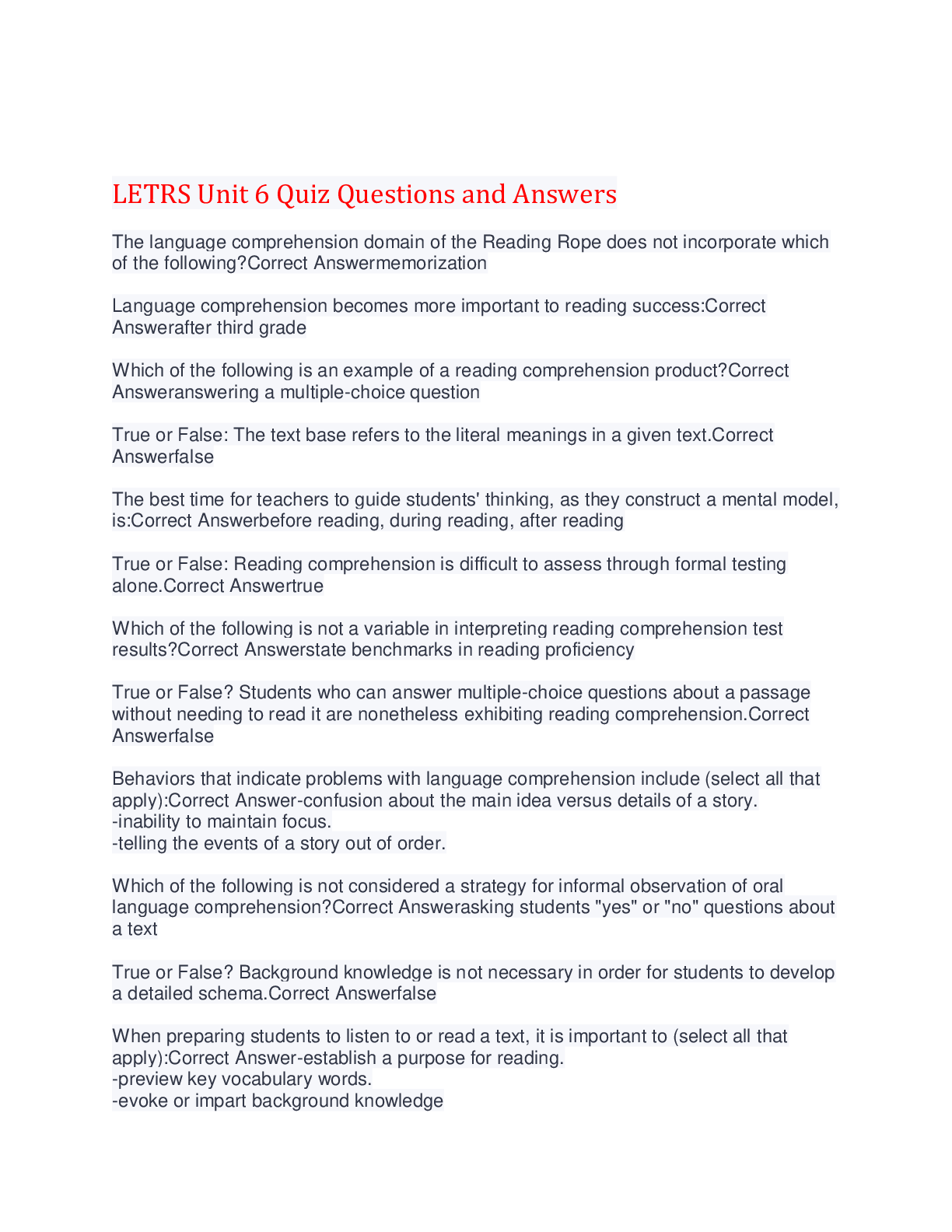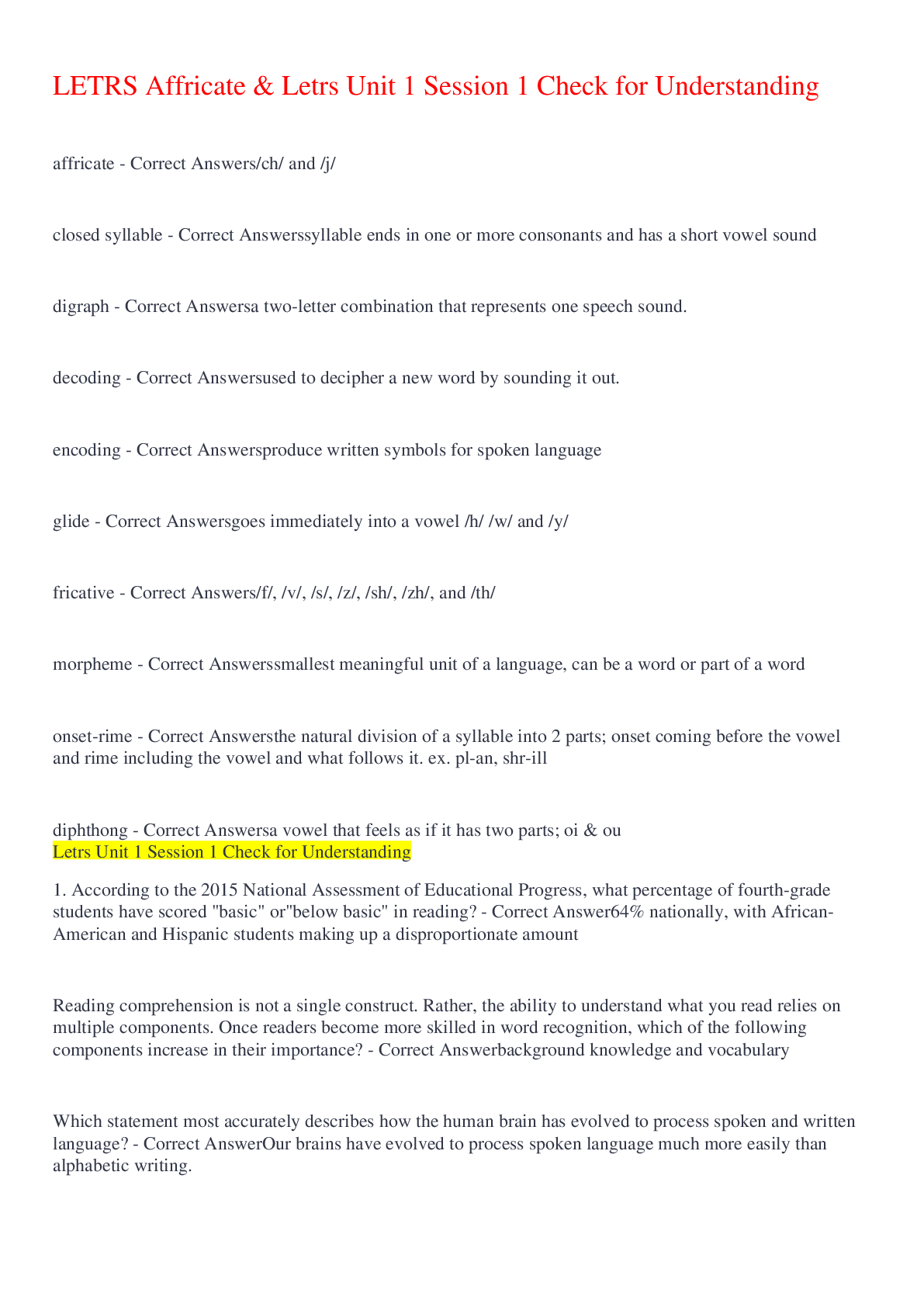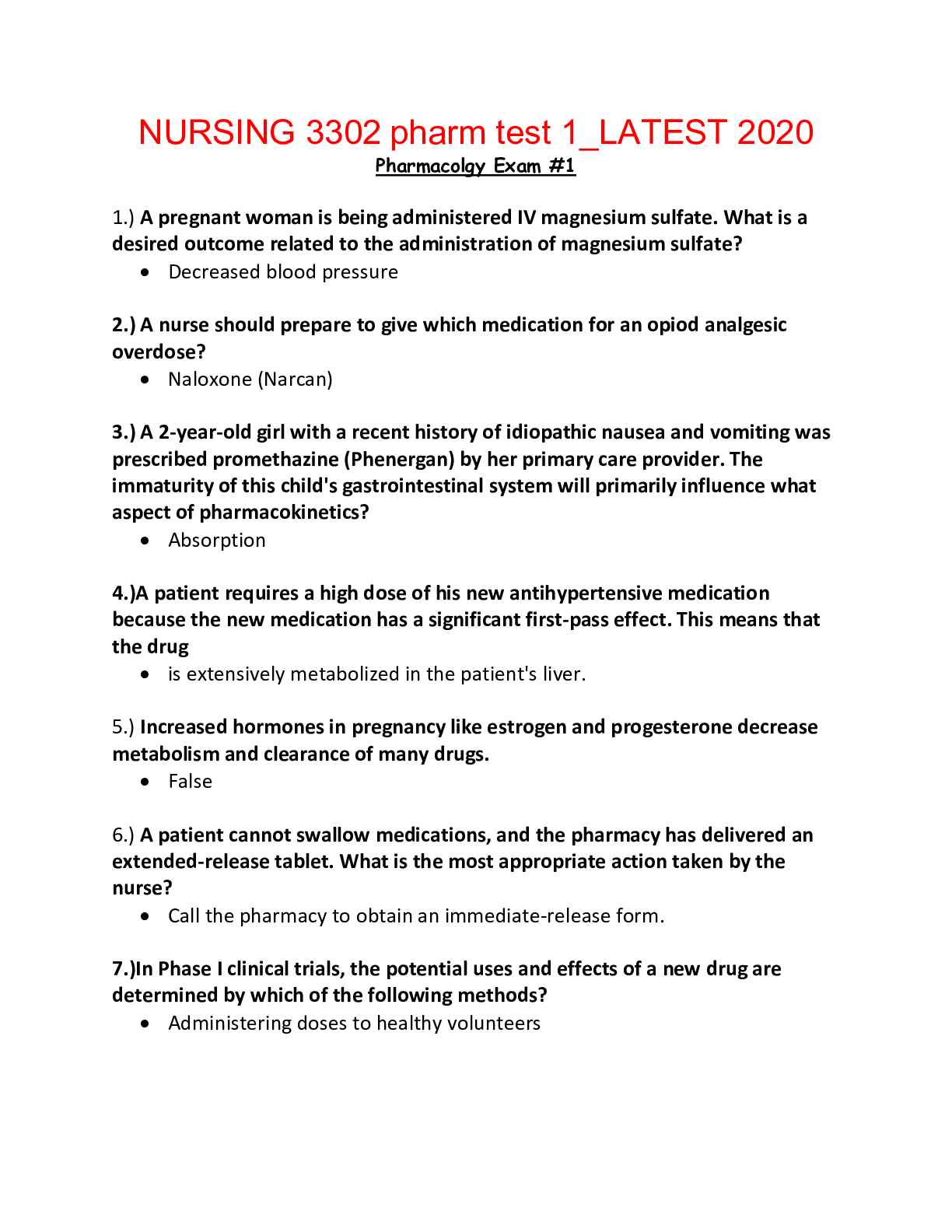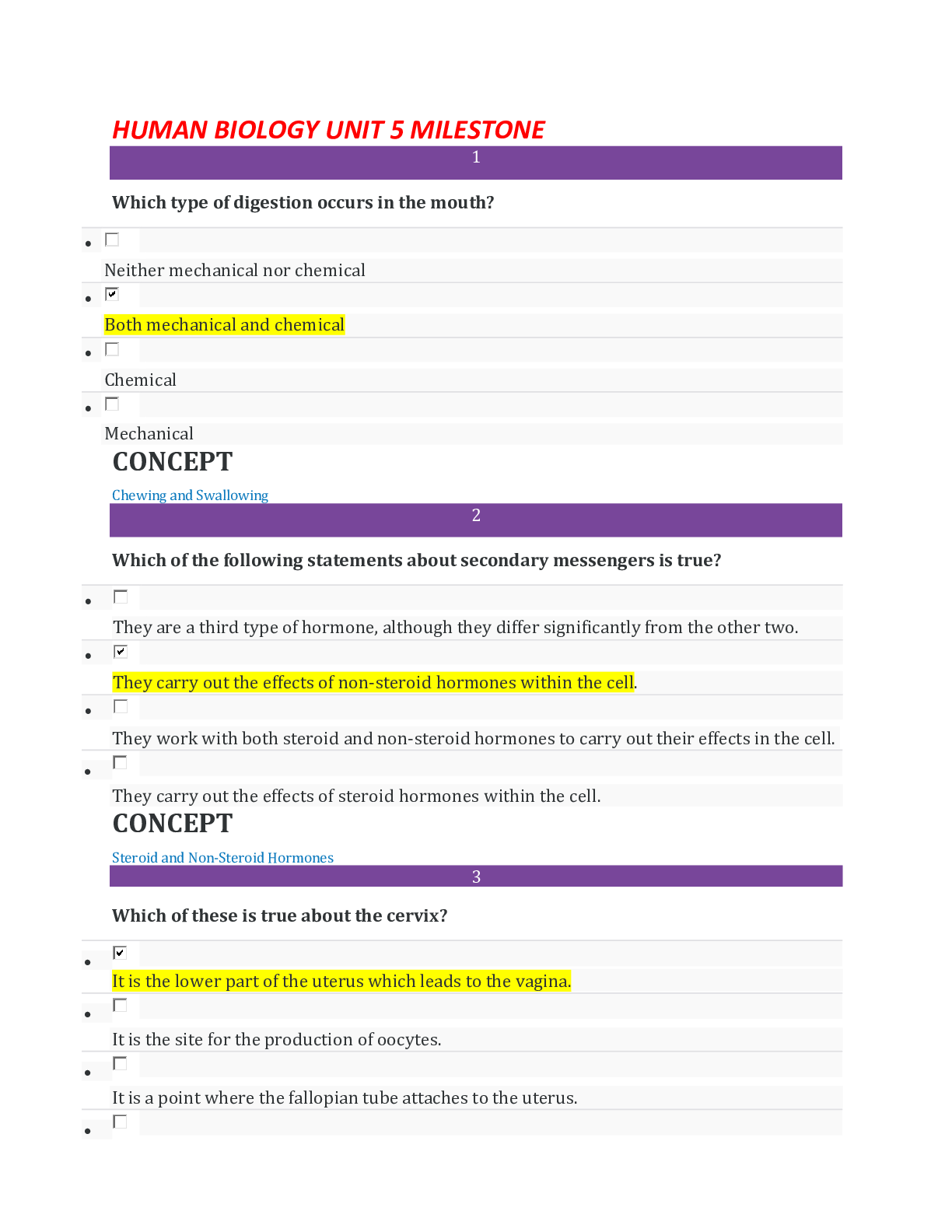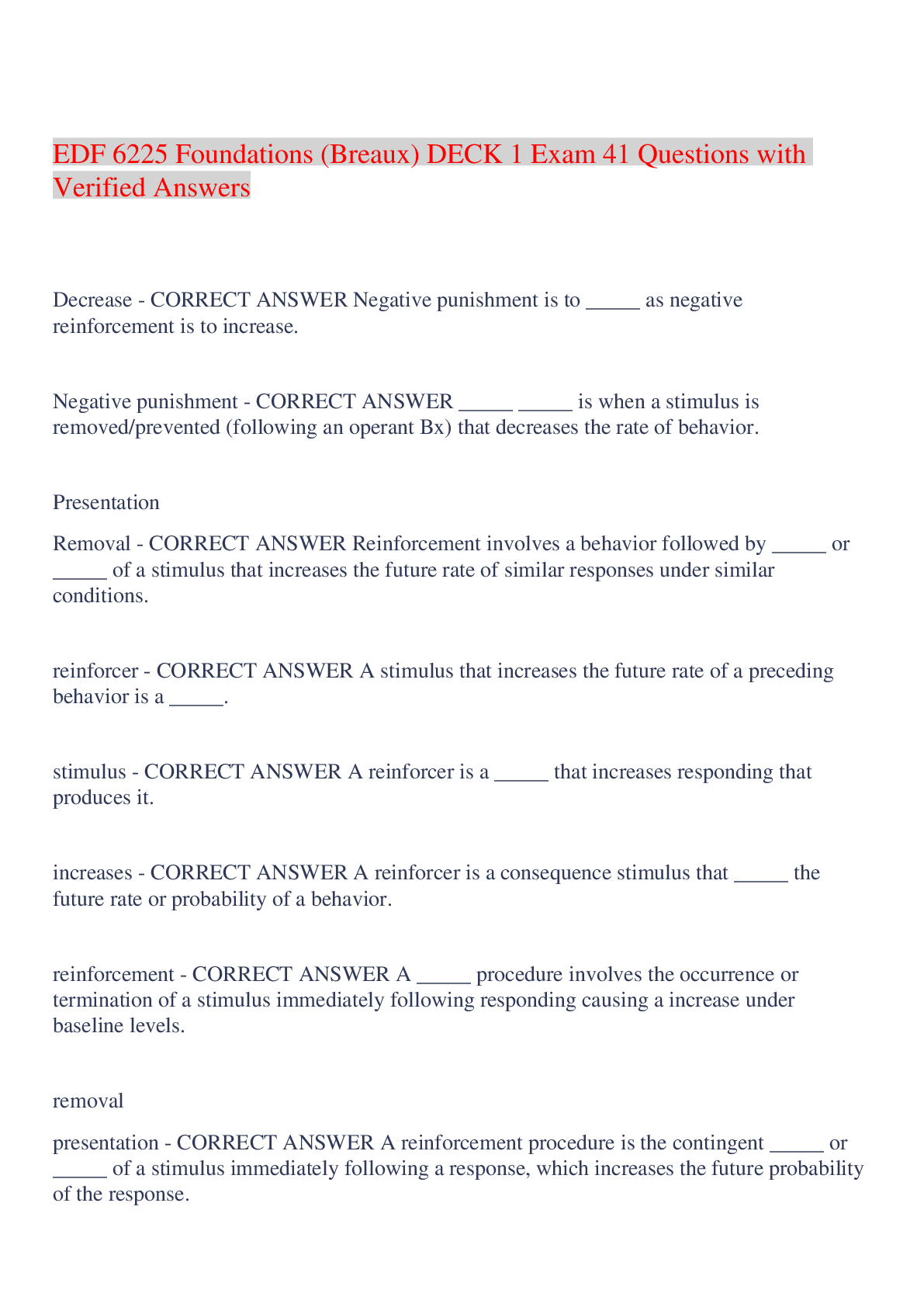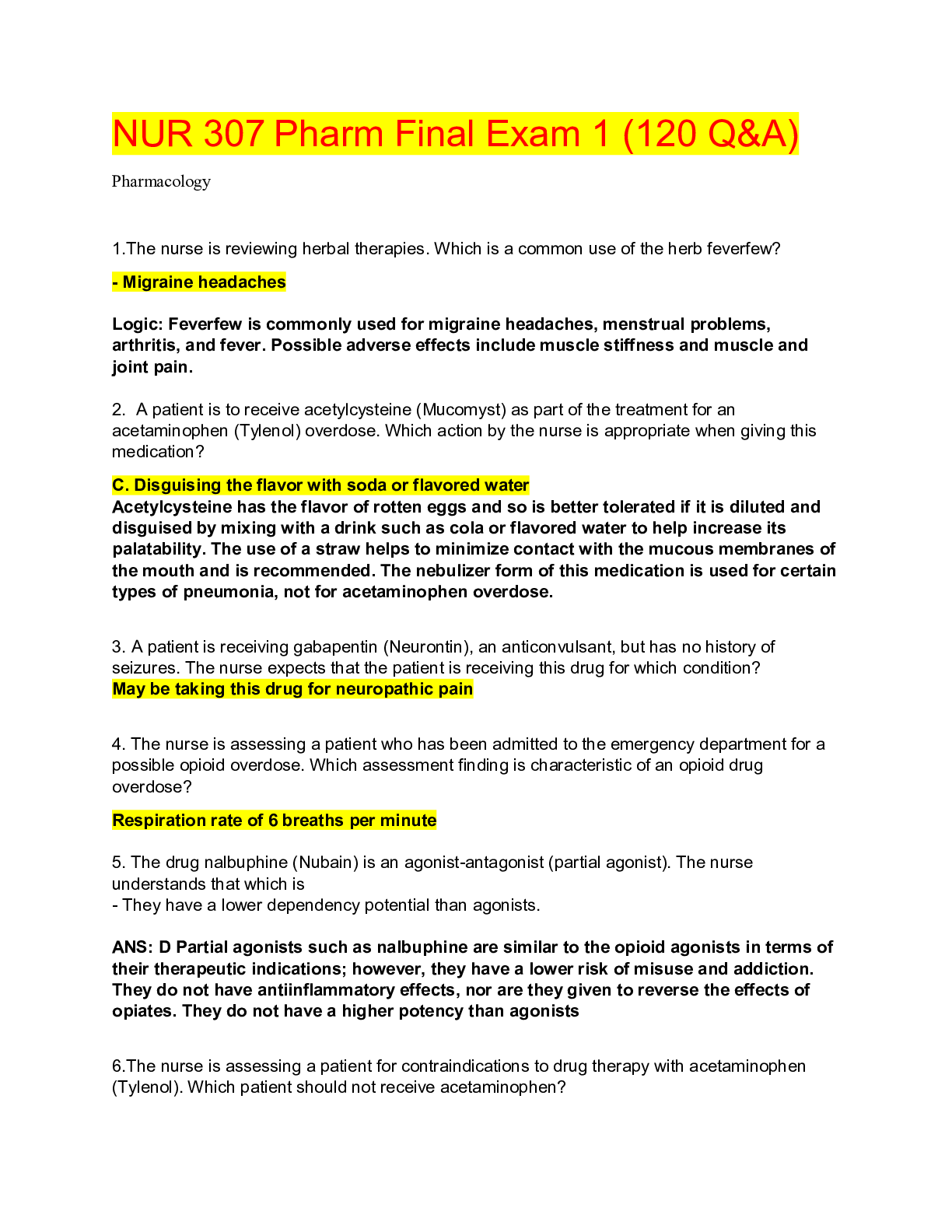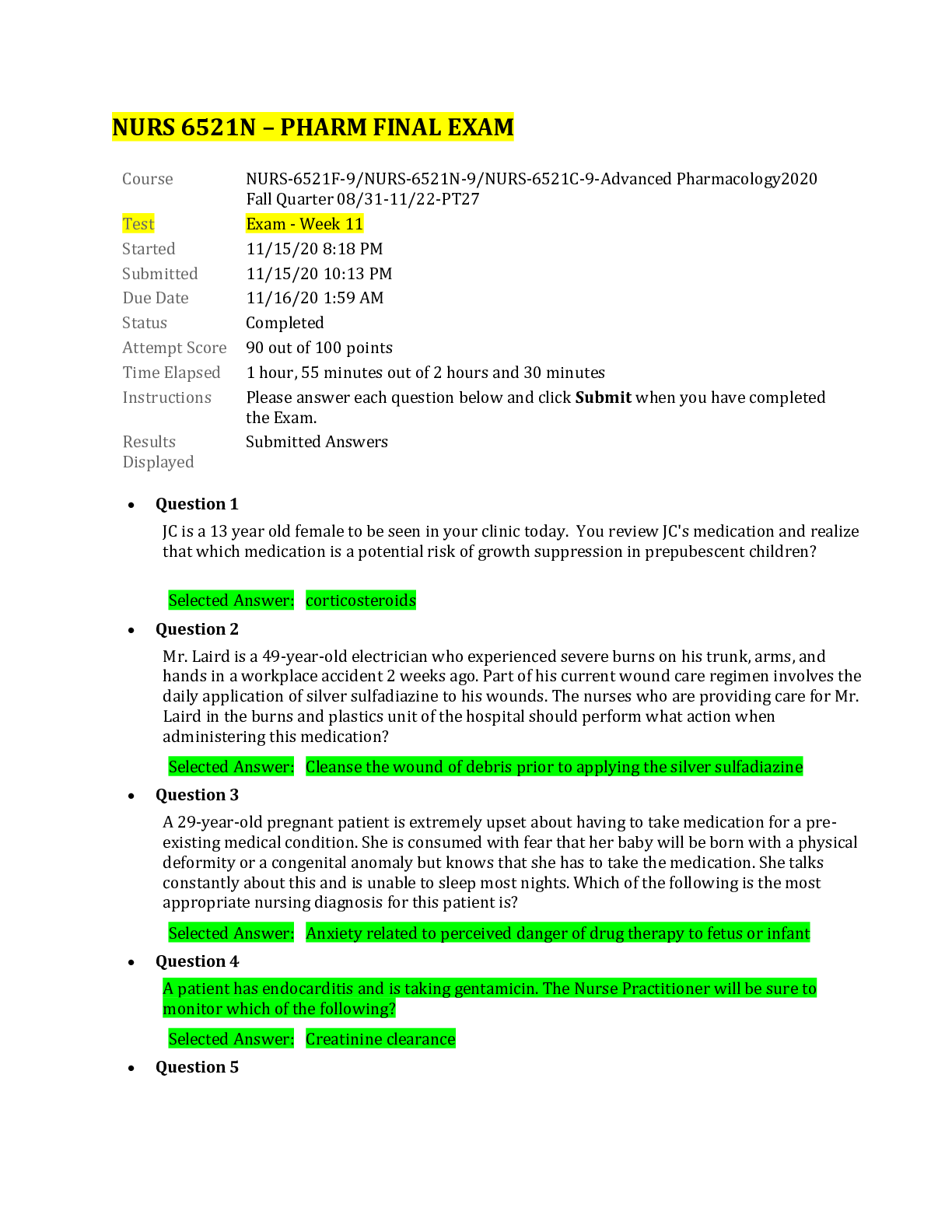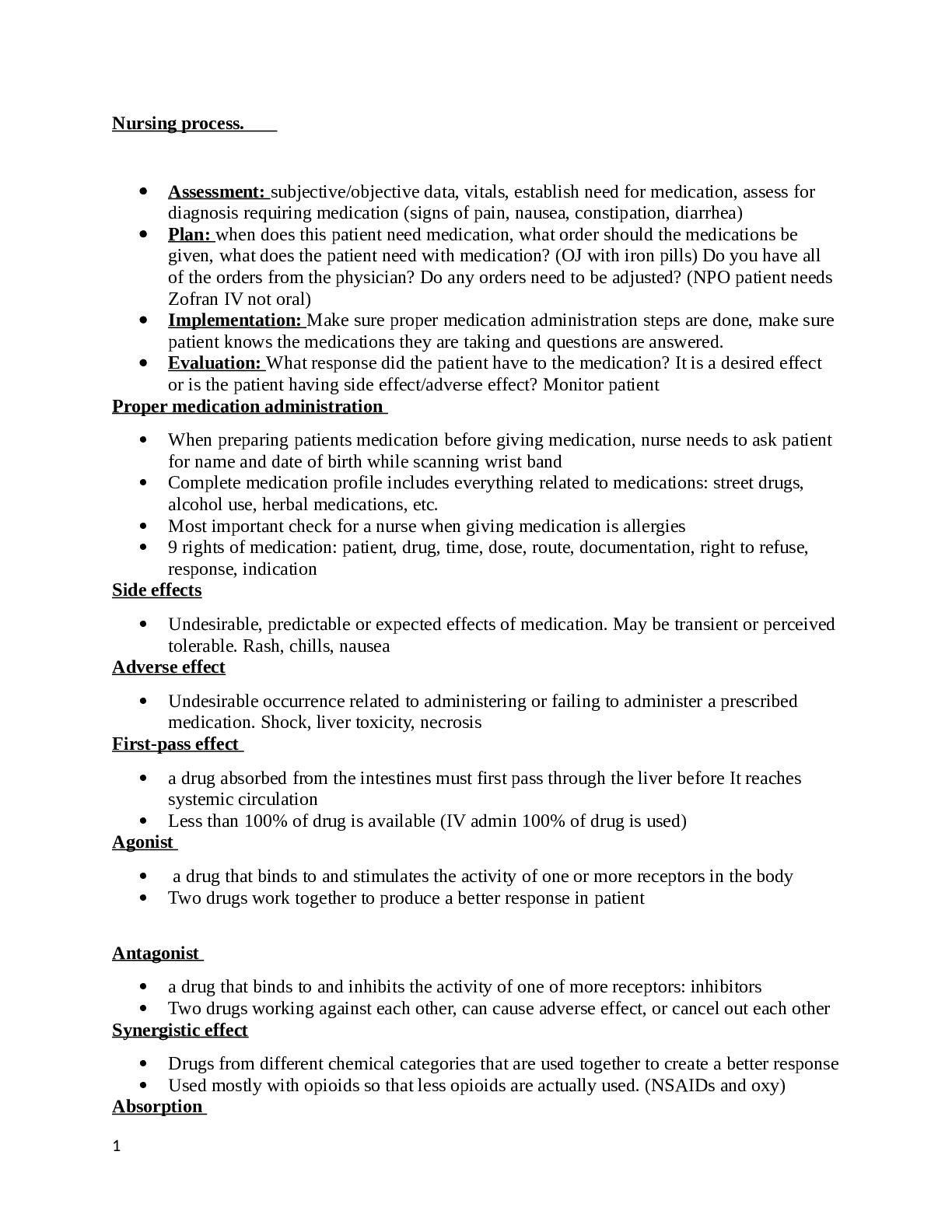NUR 307 Pharm Final Exam 1 (119 Q&A),100% CORRECT
Document Content and Description Below
1 The nurse will be injecting a drug into the fatty tissue of the patient’s abdomen. Which route does this describe? 2 a patient has been taking naltrexone (revia) as part of the treatment for ad... diction to heroin. The nurse expect that the naltrexone will have which therapeutic effect for this patient? 3 The nurse is conducting a smoking-cessation program. Which statement regarding drugs used in cigarette-smoking cessation program is true? 4 When admitting a patient with a suspected diagnosis of chronic alcohol use, the nurse will keep in mind that chronic use of alcohol might result in which condition? 5 A patient has been taking an AED for several years as part of his treatment for partial seizures. His wife has called because he ran out of his medication this morning and wonders if he can go without it for a week until she has a chance to go to the drugstore. What is the nurse’s best response? 6 When monitoring a patient who is taking a low-dose cholinergic drug, the nurse will watch for which cardiovascular effect? 7 The wife of a patient who has been diagnosed with depression calls the office and says “It’s been an entire week since he started his new medicine for his depression, and there’s no change! What’s wrong with him?” What is the nurse’s best response? 8 The nurse is reviewing a patient’s medication history and notes the patient is taking the cholinergic blocker tolterodine (Detrol). Which is an indication for this medication? 9 The nurse notes in a patient’s medication history that the patient is taking pilocarpine (Pilocar). Based on this finding, the nurse interprets that the patient has which disorder? 10 A patient who has been diagnosed with Sjrogren’s syndrome will be given cevimeline for the treatment of xerostomia. The nurse will monitor for what therapeutic effect? 11While the nurse is assisting a patient in taking his medications, the medication cup falls to the floor, spilling the tablets. What is the nurse’s best action at this time? 12The nurse has been monitoring the patient’s progress on a new drug regimen since the first dose and documenting the patient’s therapeutic response to the medication. Which phase of the nursing process do these actions illustrate? 13 A 72-year-old man has a new prescription for an anticholinergic drug. He is an active man and enjoys outdoor activities, such as golfing and doing his own yard work. What will the nurse emphasize to him during the teaching session about his drug therapy? 14 When giving an intravenous medication, the patient says to the nurse, “I usually take pills. Why does this medication have to be given in the arm?” What is the nurse’s best answer? 15 A cholinergic drug prescribed for a patient with a new diagnosis of myasthenia gravis, and the nurse provides instructions to the patient about the medication. What is important to include in the teaching? 16 When a patient is receiving a second-generation antipsychotic drug such as risperidone (Risperdal), the nurse will monitor for which therapeutic effect? 17 A patient has been taking the monoamine oxidase inhibitor (MAOI) phenelzine (Nardil) for 6 months. The patient wants to go to a party and asks the nurse, “Will just one beer be a problem?” Which advice from the nurse is correct? 18 The patient wants to take the herb valerian to help him rest at night. The nurse would be concerned about potential interactions if he is taking medication from which class of drug? 19 An elderly patient with a new diagnosis of hypertension will be receiving a new prescription for an antihypertensive drug. The nurse expects which type of dosing to occur with this drug type? 20 The nurse is giving medications through a percutaneous endoscopic gastrostomy (PEG) tube. Which technique is correct? 21 A 22-year-old patient has been taking lithium for 1 year, and the most recent lithium level is 0.9 mEq/L. Which statement about the laboratory result is correct? 22 An 18-year-old basketball player fell and twisted his ankle during a game. The nurse will expect to administer which type of analgesic? 23 A 78-year-old patient is in the recovery room after having a lengthy surgery on his hip. As he is gradually awakening, he requests pain medication. Within 10 minutes after receiving a dose of morphine sulfate, he is very lethargic and his respirations are shallow, with a rate of 7 per minute. The nurse prepares for which priority action at this time? 24 A patient has been taking donepezil (Aricept) for 2 weeks as part of the treatment for early stages of Alzheimer’s disease. Her daughter calls the prescriber’s office and is upset because “Mother has not improved one bit!” Which response by the nurse is appropriate? 25 A patient has received an accidental overdose of intravenous atropine. Which drug will the nurse prepare to administer? 26The nurse is administering parenteral drugs. Which statement is true regarding parenteral drugs? 27 An adrenergic agonist is ordered for a patient in shock. The nurse will note that this drug has had its primary intended effect if which expected outcome occurs? 28 A patient has had an overdose of an intravenous cholinergic drug. The nurse expects which drug as an antidote? 29The nurse is administering a stat dose of epinephrine. Epinephrine is appropriate for which situation? 30The nurse is discussing gene therapy in continuing education class. Which is the best definition of eugenics? 31 The nurse is measuring 4 mL of a liquid cough elixir for a child. Which method is most appropriate? 32 The nurse is teaching a 16 year old patient who has a new diagnosis of type one diabetes about blood glucose monitoring and the importance of regulating glucose intake. whendeveloping a teaching plan for this teenager, which of erikson’s stages of development should the nurse consider? 33 The nurse is about to administer a stat dose of intravenous atropine to a patient who is experiencing a symptomatic cardiac dysrhythmia. During administration of this drug, the nurse will monitor the patient closely for which adverse effect? 34 Before administering any medication, what is the nurse’s priority action regarding patient safety? 35 When administering a new medication to a patient, the nurse reads that it is highly protein bound. Assuming that the patient’s albumin levels are normal, the nurse would expect which result, as compared to a medication that is not highly protein bound? 36 A patient has been taking tolterodine (Detrol), but today her prescriber changed her to a newer drug, darifenacin (Enablex). What advantage does darifenacin have over the tolterodine? 37 During an admission assessment, the nurse discovers that the patient does not speak english. which is considered the ideal resource for translation? 38 Nurses have the ethical responsibility to tell the truth to their patients. What is this principle known as? 39 The nurse is reviewing a list of scheduled drugs and notes that Schedule C-1 drugs are not on the list. Which is a characteristic of Schedule C-1 drugs? 40 When the nurse teaches a skill such as self-injection of insulin to the patient, what is the best way to set up the teaching/learning session? 41 Carbidopa-levodopa (Sinemet) is prescribed for a patient with Parkinson’s disease. The nurse informs the patient that which common adverse effect can occur with this medication? 42 When giving a scheduled morning medication, the patient states, “I haven’t seen that pill before. Are you sure it’s correct?” The nurse checks the medication administration record and verifies that it is listed. Which is the nurse’s best response? 43 A 14-year-old patient has been treated for asthma for almost 4 months. Two weeks ago, she was given salmeterol as part of her medication regimen. However, her mother has called the clinic to report that it does not seem to work when her daughter is having an asthma attack. Which response by the nurse is appropriate? 44 The nurse is giving an intravenous dose of phenytoin (Dilantin). Which action is correct when administering this drug? 45 In preparation for eye surgery, the nurse monitors for which desired drug effect in a patient who is receiving a cholinergic-blocking eyedrop medication? 46 The nurse will monitor for which adverse effect when administering an anticholinergic drug? 47 A 38-year-old male patient stopped smoking 6 months ago. He tells the nurse that he still feels strong cigarette cravings and wonders if he is ever going to feel “normal” again. Which statement by the nurse is correct? 48 The patient is receiving two different drugs. At current dosages and dosages forms, both drugs are absorbed into the circulation in identical amounts. Which term is used to identify this principle? 49 The nurse is aware that adrenergic drugs produce effects similar to which of these nervous systems? 50 When monitoring the patient receiving an intravenous infusion to reduce blood pressure, the nurse notes that the patient’s blood pressure is extremely low, and the patient is lethargic and difficult to awaken. This would be classified as which type of adverse drug reaction? 51 Which activity best reflects the implementation phase of the nursing process for the patient who is newly diagnosed with hypertension? 52 The nurse is aware that confusion, forgetfulness, and increased risk for falls are common responses in an elderly patient who is taking which type of drug? 53 The U.S. Food and Drug Administration has issued a warning for users of antiepileptic drugs. Based on this report, the nurse will monitor for which potential problems with this class of drugs? 54 A 49-year-old patient is in the clinic or a follow-up visit 6 months after starting a beta blocker for treatment of hypertension. During her visit, his blood pressure is 169/98 mm Hg, and he eventually confesses that he stopped taking his medicine 2 months ago because of an “embarrassing problem.” What problem did the patient most likely experience with this medication that caused him to stop taking it? 55 When reviewing the mechanism of action of a specific drug, the nurse reads that the drug works by selective enzyme interaction. Which of these processes describes selective enzyme interaction? 56 The nurse is monitoring a patient who has been taking carbamazepine (Tegretol) for 2 months. Which effects would indicate that autoinduction has started to occur? 57. A hospitalized patient is experiencing a severe anaphylactic reaction to a dose of intravenous penicillin. Which drug will the nurse expect to use to treat this condition? 58. A patient is on a low-dose dobutamine drip for heart failure. She had been feeling better but now has a sense of tightness in her chest, palpitations, and a bit of anxiety. Her heart rate is up to 110 per minute, and her blood pressure is 150/98 mm Hg (increased from previous readings of 86 per minute and 120/80 mm Hg). What is the nurse immediate concern for this patient? 59. During a nursing assessment, which question by the nurse allows for a greater clarification and additional discussion with the patient? 60. The nurse is setting up a teaching session with a 85-year-old patient who will be going home on anticoagulant therapy. Which educational strategy would reflect consideration of the age-related changes that may exist with this patient? 61. The nurse is assigned to a patient who is newly diagnosed with type 1 diabetes mellitus. Which statement illustrates an outcome criterion for this patient? 62. A 25-year-old woman is visiting the prenatal clinic and shares with the nurse her desire to go to natural with her pregnancy. She shows the nurse a list of herbal remedies that she wants to buy so that she can avoid taking any drugs. Which statement by the nurse is correct? 63. The nurse is monitoring a patient who is the 26th week of pregnancy and has developed gestational diabetes and pneumonia. She is given medications that pose a possible fetal risk, but the potential benefits may warrant the use of the medications in her situation. The nurse recognize that these medications are in which U.S. Food and Drug Administration pregnancy safety category? 64 The nurse is preparing to administer dopamine. Which is the correct technique for administering dopamine? 65. A patient wants to take the herb gingko to help his memory. The nurse reviews his current medication list and would be concerned about potential interactions if he is taking a medication from which class of drugs? 66. The nurse is screening a patient who will be taking a nonspecific/nonselective beta blocker. Which condition, if present may cause serious problems if the patient takes this medication? 67. A patient has been taking selegiline (Eldepryl), 20 mg/day for 1 month. Today, during his office visit, he tells the nurse that he forgot and had a beer with dinner last evening, and felt awful. What did the patient most likely experience? 68. A patient has been treated with antiparkinson medications for 3 months. What therapeutic responses should the nurse look for when assessing this patient? 69. When a patient is taking an anticholinergic such as benztropine (congentin) as part of the treatment for Parkinson’s disease, the nurse should include which information in the teaching plan? 70. A patient who has been diagnosed with Sjogren’s syndrome will be given cevimeline for the treatment of xerostomia. The nurse will monitor for what therapeutic effect? 71. The nurse is reviewing pharmacology terms for a group of newly graduated nurses. Which sentence defines a drug’s half-life? 72. The patient is asking the nurse about current U.S. laws and regulations of herbal products. According to the Dietary Supplement and Health Education Act of 1994, which statement is true? 73. When discussing dosage calculation for pediatric patients with a clinical pharmacist, the nurse notes that which type of dosage calculation is used most commonly in pediatric calculations? 74. For which cultural group must the health care provider respect the value placed on preserving harmony with nature and the belief that disease is a result of ill spirits? 75. During an assessment, the patient tells the nurse that he eats large amounts of garlic for its cardiovascular benefits. Which drug or drug class, if taken, would have a potential interaction with the garlic? 76. The patient is complaining of a headache and asks the nurse which over-the-counter medication form would work the fastest to help reduce the pain. Which medication form will the nurse suggest? 77. The nurse is writing a nursing diagnosis for a plan of care for a patient who has been newly diagnosed with type 2 diabetes. Which statement reflects the correct format for a nursing diagnosis? 78. The nurse is reviewing the food choices of a patient who is taking a monoamine oxidase inhibitor (MAOI). Which food choice would indicate the need for additional teaching? 79. A patient is receiving eyedrops that contain a beta-blocker medication. The nurse will use what method to reduce systemic effects after administering the eyedrops? 80. A 58-year-old man has had a myocardial infarction (MI) has begun rehabilitation, and is ready for discharge. He is given a prescription for metoprolol (Lopressor) and becomes upset after reading the patient education pamphlet. I don’t have high blood pressure, why did my doctor give me this medicine? Which explanation by the nurse is correct? 81. When giving an intravenous medication, the patient says to the nurse, I usually take pills. Why does this medication have to be given in the arm? What is the nurse’s best answer? 82. A patient has been taking the selective serotonin reuptake inhibitor (SSRI) sertraline (Zoloft) for about 6 months. At a recent visit, she tells the nurse that she has been interested in herbal therapies and wants to start taking St. John’s wort. Which response by the nurse is appropriate? 83. During the development of a new drug, which would be included in the study by the researcher to prevent any bias or unrealistic expectation of the new drug’s usefulness? 84. A 2-year-old child is to receive eardrops. The nurse is teaching the parent about giving the eardrops. Which statement reflects the proper technique for administering eardrops to this child? 85. A patient calls the clinic to ask about taking cranberry dietary supplement capsules because a friend recommended them. The nurse will discuss which possible concern when a patient is taking cranberry supplements? 86. When administering drugs, the nurse remembers that the duration of action of a drug defined as which of these? 87. A patient has been taking Haloperidol (Haldol) for 3 months for a psychotic disorder, and the nurse is concerned about the development of extrapyramidal symptoms. The nurse will monitor the patient closely for which effects? 88. The nurse needs to administer insulin subcutaneously to an obese patient. Which is the proper technique for this injection? 89. During initial rounds, the nurse notes that a dobutamine infusion has extravasated into the forearm of a patient. After stopping the infusion, the nurse follows standing orders and immediately injects phentolamine (Regitine) subcutaneously in a circular fashion around the extravasation site. What is the mechanism of action of the phenatolamine in this situation? 90. A patient has just been told that she has the genetic markers for a severe type of breast cancer. After the patient meets with the physician, the patient’s daughter asks the nurse, what did the doctor tell my mother? She seems upset. What is the nurse’s best response? 91. When giving a scheduled morning medication, the patient states, I haven’t seen that pill before. Are you it is correct? The nurse checks the medication administration record and verifies that it is listed. Which is the nurse’s best response? 92. When a patient is receiving a second-generation antipsychotic drug, such as risperidone (Risperdal), the nurse will monitor for which therapeutic effect? 93. When taking a telephone order for a medication, which action by the nurse is most appropriate? 94. The nurse is giving medications through a percutaneous endoscopic gastrostomy (PEG) tube. Which technique is correct? 95. The nurse is administering parental drugs. Which statement is true regarding parental drugs? 96. A 14-year-old patient has been treated for asthma for almost 4 months. Two weeks ago, she was given salmeterol as part of the medication regimen. However, her mother has called the clinic to report that it does not seem to work when her daughter is having an asthma attack. Which response by the nurse is appropriate? 97. A patient has been taking naltrexone (ReVia) as part of the treatment for addiction to heroin. The nurse expects that the naltrexone will have which therapeutic effect for this patient? 98. Phenytoin (Dilantin) has a narrow therapeutic index. The nurse recognizes that this characteristic indicates which of these? 99. The nurse reads in the patient’s medication history that the patient is taking buspirone (BuSpar). The nurse interprets that the patient may have which disorder? 100. The patient has been taking an over-the-counter (OTC) acid-reducing drug because he has had stomach problems for several months. He tells the nurse that the medicine help as long as he takes it, the symptoms return. Which statement by the nurse is the best advice for this patient? 101. A 50-year-old man who has been taking phenobarbital for 1 week is found very lethargic and unable to walk after eating out for dinner. His wife states that he has no other prescriptions and that he did not take an overdose the correct number of pills is in the bottle. The nurse suspects that which of these may have happened? 102. A patient has a prescription for oxybutynin (Ditropan), an anticholinergic drug. When reviewing the patient’s medical history, which condition, if present, would be considered a contraindication to therapy with this drug? 103. The nurse is presenting a substance-abuse lecture for teenage girls and is asked about roofies. The nurse recognizes that this is the slang term for which substance? 104. The nurse is discussing gene therapy in a continuing education class. Which is the best definition of eugenics? 105. A patient who has advanced cancer is receiving opioid medications around the clock to keep him comfortable as he nears the end of his life. Which term best describes this type of therapy? 106. The nurse is administering drugs to neonates and will consider which factor may contribute the most to drug toxicity? 107. An 83-year-old woman has been given a thiazide diuretic to treat mild heart failure. She and her daughter should be told to watch for which problem? 108. a member of an investigational drug study team is working with healthy volunteers whose participation will help to determine the optimal dosage range and pharmacokinetics of the drug. The team member is participating in what type of study? 109. A patient has been selected as a potential recipient of an experimental drug for heart failure. The nurse knows that when informed consent has been obtained, it indicates which of these? 110. During a busy night shift, a new nurse administered an unfamiliar medication without checking it in a drug handbook. Later that day, the patient had a severe reaction because he has renal problem, which was a contraindication to that drug. The nurse may be liable for which of these? 111. The nurse recognizes that adrenergic drugs cause relaxation of the bronchi and bronchodilation by stimulating which type of receptors? 112. A client with asthma is to begin medication therapy with a metered-dose inhaler. What is an important reminder to include during your teaching sessions with her? 113. A patient has a new prescription for the transdermal form of scopolamine. The nurse knows that this form of scopolamine is used for which condition? 114. The nurse is reviewing the use of anticholinergic drugs. Anticholinergic drugs block the effects of which nervous system? 115. A patient is taking flurazepam (Dalmane) 3 to 4 nights a week for sleeplessness. She is concerned that she cannot get to sleep without taking the medication. What nonpharmacologic measures should the nurse suggest to promote sleep for this patient? 116.When treating patients with medications for Parkinson’s disease, the nurse knows that thewearing-off phenomenon occurs for which reason? 117. A patient is brought to the emergency department for treatment of a suspected overdose. The patient was found with an empty prescription bottle of a barbiturate by his bedside. He is lethargic and barely breathing. The nurse would expect which immediate intervention? 118. The nurse is providing teaching regarding drug therapy to the husband of a woman with Alzheimer's disease. She was diagnosed 3 months ago, has mild memory loss, and will be receiving donepezil (Aricept). What is the drug's action? 119. While monitoring a depressed patient who has just started SSRI antidepressant therapy, the nurse knows to observe for which problem during the early time frame of this therapy? [Show More]
Last updated: 2 years ago
Preview 1 out of 15 pages

Buy this document to get the full access instantly
Instant Download Access after purchase
Buy NowInstant download
We Accept:

Reviews( 0 )
$17.00
Can't find what you want? Try our AI powered Search
Document information
Connected school, study & course
About the document
Uploaded On
Nov 29, 2020
Number of pages
15
Written in
Additional information
This document has been written for:
Uploaded
Nov 29, 2020
Downloads
0
Views
83


